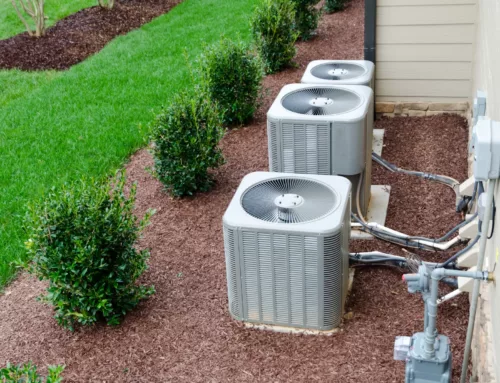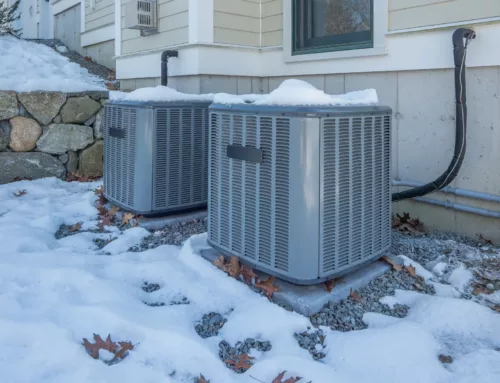Fall can be a confusing time, weather wise. Nights start getting colder, but days can still be scorching hot. And you never quite know when temperatures will really start falling. But what is certain is that winter is coming, and eventually you’ll need to switch from air conditioning to heating. Here are a few tips to keep you comfortable during that transition while optimizing your HVAC system’s performance.
Open Your Windows on Cool Nights
As temperatures start dropping, we recommend turning off your air conditioner and opening windows to allow cool air into your home. Strategically placed fans can circulate that air to keep your home even cooler. It’s good to air out your home every once in a while, and it’ll allow you to save on energy bills for a month or two until you need to start up your furnace. Even if you prefer to run your air conditioner during the day, opening windows at night can give your system some relief while still keeping you comfortable. Just remember to close the windows if you turn your AC back on.
Adjust Your Thermostat
Your air conditioner works so hard to keep you cool during the summer. Then winter hits, and all you want is to be warm. It’s unlikely that you prefer the same temperature in your home during both extremes. The United States Department of Energy actually recommends setting your thermostat to 78 degrees in the summer and 68 degrees in winter for peak efficiency. Though you may not agree with those temperatures, some adjustment is likely necessary. If you have a smart or programmable thermostat, fall is the time to set your schedule for your furnace. While your family is at work or school, setting the thermostat to a lower temperature will save on heating costs and put less strain on your HVAC system–a win win.
Schedule Maintenance For Your HVAC System
There are many reasons why your HVAC system should be checked by a professional at least once a year to make sure it’s working at peak efficiency. A HVAC technician can often prevent major breakdowns down the line by replacing worn parts and anticipating later problems. If you didn’t get your system checked in the spring, we recommend you do so in the fall so your furnace is ready to work hard for you over the winter. A breakdown on the coldest day of the year will be costly and inconvenient! It’s best to get your system checked when you don’t need it as desperately so any repairs can be made in advance. Reliance Heating & Air Conditioning offers maintenance plans in eastern Pennsylvania to extend the life of your system and keep it running smoothly all year long.
Change Your Air Filters
If you participate in one of Reliance’s maintenance plans, we’ll take care of changing your air filters for you. If you don’t, you can take care of this important task on your own. Although there are many different types of air filters as well as other factors that impact how often your filter should be changed, in southeastern Pennsylvania we recommend this be done at least twice a year. An easy way to remember this is to change it once in the spring before you turn on your AC and once in the fall before you turn on your heater. That way your system will start the season with a clean air filter primed to work at maximum efficiency.
Prep Outdoor Air Conditioner Unit For Winter
If you have central air, then you have a compressor unit outside your home. Fall is a good time to give it a little extra care by clearing away any vegetation that may be growing nearby. If your compressor is near a tree, you should remove any branches, leaves, or nuts that may have fallen or blown onto the unit. Fall is actually the most hazardous season for outdoor air conditioning components. These units are built to withstand severe weather, even snow and ice, but foreign matter can get inside and clog up the fans. If you have trees near your unit, you may consider covering it in the fall. However, the wrong cover can trap moisture inside your unit and lead to mold, or entice critters to make their home inside. Learn more about why you should or shouldn’t cover your unit before deciding. Whatever you decide, you should keep your outdoor unit as free of debris and vegetation as possible to prevent future problems. Don’t cover the unit until you are sure you’re done with air conditioning!
Take Out Window Air Conditioner Units
If you use window air conditioner units, you should remove them from windows and store them indoors to prolong their life. But if you’re currently relying on window units to cool your home or supplement an existing central air system, we recommend you consider installing a more efficient mini split air conditioner instead.
Test Your Furnace Before You Need It
Imagine this: a cold snap comes on suddenly. You turn on your furnace. Nothing happens. When you call a technician, they can’t come out for a day or two because they’re helping so many others who made the same discovery. To prevent such an unpleasant surprise, it’s a good idea to test your furnace before you really need it. That way if you discover a problem, it’s not a crisis if it can’t be repaired immediately. Turn on your furnace and raise the temperature on your thermostat by ten degrees. You should hear the furnace kick on and feel warm air start to come out of the vents. Take notice of any weird sounds or smells, and make sure the temperature rises as it should. If the furnace doesn’t seem to be working properly, call in a professional to get it assessed.
Check Windows For Leaks
Improperly sealed windows can let warm (and cool) air escape your home, leading to higher utility bills. Fall is a great time to fix any leaks. There are several ways you can find them. Visibly inspect each window from the inside and outside of your house, looking for any gaps or cracks around the frame. While inside, turn all lights off in a room and see if any daylight shines through around the window–it shouldn’t! On a cold day, hold your hand about an inch away from the window and move it around the frame. If you feel a draft, you have a leak. You can fix leaks yourself with caulk and weatherstripping. But if your windows are more than 15 years old, you may want to consider having them replaced.
Check Carbon Monoxide and Smoke Alarms
Fall is a great time to change the batteries in all the carbon monoxide and smoke alarms in your home. You should then check each unit to make sure it’s working properly. These alarms should have a test button. If an alarm fails the test even after you’ve replaced the batteries, it’s time to change the alarm. Carbon monoxide is odorless, invisible, and deadly, and can be produced by anything that burns fuel – such as your furnace. That’s another reason why regular furnace maintenance is so important. But if a leak or fire does occur, properly functioning alarms can save your life!
Let Reliance Help You Transition From Summer to Fall
While there are many steps you can and should take on your own to transition your HVAC system from summer to fall, Reliance Heating & Air Conditioning is here to ensure your system is ready to handle winter’s colder temperatures. Whether your system hasn’t been serviced in a while or you need help installing a programmable thermostat, contact us for exceptional service and a quality guarantee.
Contact Reliance today for all your heating and air conditioning needs!
Financing available, contact us for more details.







